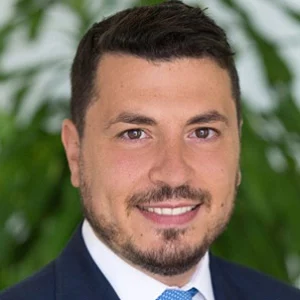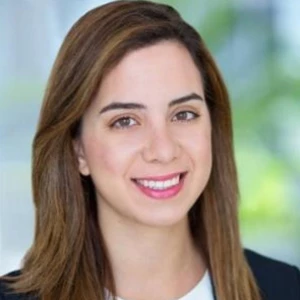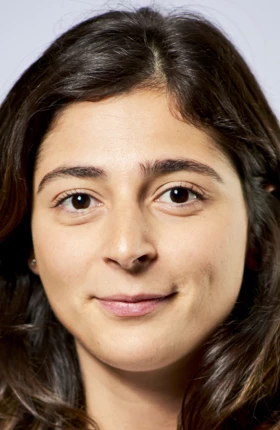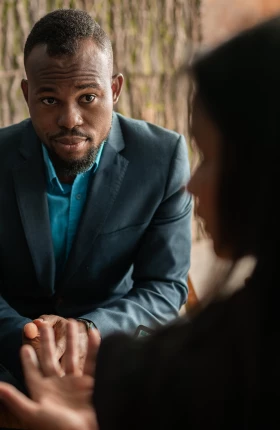Sarwa, the name is Arabic for wealth, is the brainchild of Co-Founders Mark Chahwan (CEO), Nadine Mezher (CMO), and Jad Sayegh (CTO). Established in 2017, with a commitment to make investing easy, Sarwa is a UAE-based robo-advisory wealth management firm. Lately, Sarwa has been on a clear path to notoriety as its cutting-edge technology simplifies the entire investing experience and provides clients with the best possible returns.
Recently, Giuseppe Bonaccorsi, BCG Managing Director & Partner Middle East, and Chantal Chalouhi, Principal Middle East, sat down with Mark and Nadine to discuss Sarwa’s unique business model. Our conversation covered the challenges in launching start-ups, the crypto currency market, and how to drive innovation and growth, among others.


Innovation Talks with BCG Middle East
Innovation Talks focuses on consumer and industry trends, highlighting the ways in which digital and innovative companies tackle their most ominous challenges, and what they have to offer their local customers.
Our featured guests discuss how digital is enabling new business models and innovations that do not yet exist in our region—but will soon—and offer advice to young entrepreneurs who want to learn more about setting-up and growing startups in Middle East.
The impact of COVID on businesses is an important part of the debate as it has changed consumer trends and introduced new ways of working that are re-shaping their culture.
Tell us more about the Sarwa business model, particularly, how it works.
Mark. Sarwa is the leading personal finance app in the region where clients can save, invest, and trade all in one place. Our business model is designed to provide accessible, low-cost, smart investments. We launched the firm to help young professionals, NextGens, invest their money. It wasn’t long before we noticed that pretty much everyone wants accessible, low-cost, smart investing. Sarwa is really about the customer base and the value proposition, which, when applied to investing, allows young professionals to save more, invest more, and avoid all the additional fees and hidden costs that are the hallmark of traditional platforms. Essentially, our clients get to keep more of their own money.
Nadine. Sarwa is very customer centric. We are a business-to-consumer (B2C) company that, as Mark mentioned, is built on three brand promises—low cost, high accessibility, and true ease of use. We are a very human brand.
What are the main advantages and the challenges that you see in the local financial markets?
Nadine. From an opportunity perspective, local markets represent very young populations with high mobile penetration. There is room for improvement in financial services. And while we have seen quick adoption of digital platforms, we wanted to bring something very different to the market. For example, we know that financial services fees in the region are quite high. We wanted to disrupt this and provide ease-of-use and accessibility. So, we offer very low account minimums and very low fees. Again, when you compare us to competitors, there are no fees the first year for accounts with less than $2,500. After the first year, fees are between 0.85% to 0.5%; the more money invested the more the fees drop. The unique proposition that Sarwa brings to the market is designed to disrupt and “democratize” investing in general.
Building on this point, compared to other markets, how would you describe local consumers from a behavioral-needs standpoint?
Mark. Our market is young with a lot of first-time investors. Last year, when we were all at home due to COVID, savings rates went up. Around the globe, people had more disposable income but less need to spend it, which sparked a question: “What should I do with my money?” At the time we were seeing more activity on the trading side, with more trading ads and trading platforms. Now, we are seeing a shift toward more proper diversification and investing, which is refreshing as people had been losing money. People began questioning if there was a better way. And, of course, there was.
Nadine. There’s been a shift in behavior. Our culture was very focused on spending while investments were typically limited to real estate. Today, financial literacy is on the rise and more people are interested in investing and growing their wealth.
Your recent success in funding rounds is a testament to your market success. What are your aspirations for Sarwa going forward? Did your business model or your vision change during COVID? And, if so, how?
Mark. One reason we were so excited about our backing from Mubadala is how big we want to take Sarwa, because it's going to require a lot of funding. As Nadine said, we chose the direct B2C route to build the brand and acquire customers ourselves rather than go through a bank. The Mubadala deal is a major milestone. Did our business model and vision change during COVID? Yes. It gave us more confidence to become a B2C platform. Initially, when we brainstormed ideas, we would go back and forth between, “All right, we built a brand. We have our own channels. Should we partner with Bank A or Bank B? Should we ‘white label’ Sarwa to them?” And, when we saw an uptake in COVID, we said “No.” We were much more comfortable in our DNA as a company. We realized that Sarwa on its own could be something big rather than a stepping-stone to white label.
How did you evolve the product?
Nadine. We started with a product called “Sarwa Invest,” which, at its core, is about hands-off investing. Investors put their money into a portfolio of ETFs that is long term, passive, and very globally diversified. Their money is put to work. Today, we're expanding to other products. We also announced “Sarwa Crypto,” which is the same globally diversified portfolio only with exposure to bitcoin. So, 5%. And we're launching new products as we go. We want Sarwa to become the go-to financial app. We plan to be a one-stop-shop for everything that investors need for their money. As we like to say: “We are here for you… from the moment you get your paycheck, to how you spend your money, to how you grow your money.”
What is your overall perspective on the cryptocurrency market in UAE and GCC?
Mark. As a company, we have embraced the cryptocurrency market. Our investors can opt-in to a 5% exposure to bitcoin through a fund called Grayscale, which is experiencing significant demand. A decision to be all in or all out of the cryptocurrency market is more complicated, as is having a certain amount of wealth allocated to crypto. We discussed this with the regulator—an easy conversation given that UAE in general embraces crypto—finding that the outlook on crypto is positive. We recommend looking into Web 3.0, which highlights use cases that can come out of crypto or, more specifically, non-fungible tokens (NFTs). We also recommend a walk down Gate Avenue at DIFC where you will see a unique piece of NFT artwork and a bitcoin logo. In general, the environment is positive.
Humans are good at some things while technology is good at other things; And we continue to experiment with these as there must be room for both.
At BCG, we define a bionic company as one that connects human capabilities, technologies, and outcomes. How does Sarwa bring these elements together to drive innovation and growth?
Mark. Humans are good at some things while technology is good at other things; technology automates, is seamless, and more cost efficient. A favorite aspect of technology is the ability to automate decision making. When the markets are down, technology allows us to buy low and sell high. This prevents the emotional roller coaster ride that we humans tend to suffer. We have a team of wealth associates and wealth advisors in place to guide customers. We also host webinars where we provide data-driven insights—from how markets have behaved in the past to how they may behave in the future. These are the types of activities that occur between humans and technologies. And we continue to experiment with these as there must be room for both.
Nadine. I’ll give you a simple example: Sarwa was born in the cloud. During the pandemic, this made it easier for us to support our clients and to be “present” even though we could not meet in person. And because technology drives down costs, we can offer Sarwa to a large database of clients and thus grow into the mass market. Here’s another example: Consider how financial advisory is traditionally performed—we make an appointment, drive to the appointment, park the car, go up the elevator, sign papers, go down the elevator, and drive home. This takes time and effort. Today, the entire process is performed online.
As a successful female entrepreneur, what is your advice to young women trying to break into the start-up world or the fintech world?
Nadine. One word: perseverance. Every business has its challenges, whether you’re in business alone or with great partners. I am lucky enough to have two co-founders who have made the journey much easier. And because I've run a business before, I understand that it's not an easy road. Yet, women are improving on many fronts. More women are going into STEM, whether in the workforce or in education. My little girl is five years old and already learning how to code. There is a definite change underway. If you have a great idea and a good support system around you, don't give up. Just go for it.
This has been a valuable discussion. Thank you, Mark and Nadine, for sharing your valuable insights and perspectives on the market. It was a pleasure having you with us. Best of luck in the future.







